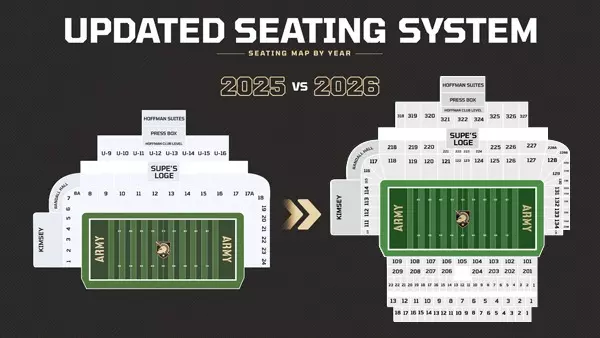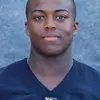Army West Point Athletics

Feinstein's Findings: Adjustments Were the Difference
October 30, 2016 | Football
Football coaches are famous for their ability to crank out cliché answers—especially when confronted with the kind of queries thrown at them by supercilious—not to mention silly—sideline reporters.
Army Coach Jeff Monken was in the middle of one of those answers on Saturday evening when a thought occurred to him. "A lot of times making adjustments doesn't really change things," he said. "Today though, we made some adjustments and they made a difference."
Truer, non-cliche words have never been spoken.
Army looked almost helpless on offense during the first half at Wake Forest. The running attack that came into the game ranked second in the country had produced a total of 42 yards in the first half. Drives that began at the Wake 34; 43 and 33 had produced seven points—and that had come on one big pass play, a 43-yard throw from Ahmad Bradshaw to Edgar Poe. Two fourth down plays in Wake territory had been completely blown up by Demon Deacon defenders before they even began to take shape.
In spite of two interceptions by the defense, the Black Knights were lucky to be tied 7-7 at the break.
Then came the adjustments.
Monken and his coaches realized that, even without slotbacks Joe Walker and Tyler Campbell, the offense HAD to get to the edges and it had to do so quickly. Literally. Read and react plays simply weren't going to work against the speed of Wake's defense.
And so, Army more or less abandoned the notion of Bradshaw trying to decide on whether to run or pitch; whether to pull the ball from the fullback's stomach and decide whether to run right or left. Plays had to develop quickly. The offense became relatively simple and fast: the ball went directly into Andy Davidson or Darnell Woolfolk's stomach. Or, Bradshaw took it and ran—no fake to the fullback involved or—most importantly—he turned and pitched it right away to a slotback sprinting behind him: Kell Walker; Jordan Asberry; John Trainor or Christian Drake.
All four of them contributed crucial pickups that not only picked up yards but forced the Wake defense to extend towards the sidelines. Slowly but surely that opened the middle for Bradshaw, Davidson and Woolfolk. Army's total of 238 rushing yards was well below its average, but 196 of them came in the second half and 60 of them—on 12 consecutive rushing plays—came on the drive that clinched a massively important 21-13 victory.
The adjustments—and the superb execution of the entire offense, notably the offensive line—turned the game around.
But the game would not have been there to win if not for the defense.
Postgame analysis in football almost always focuses on the offense. After all, Army's four wins prior to Saturday had come in games in which it won the turnover battle—in fact the offense hadn't turned the ball over in any of those wins. In all three losses, turnovers had played a deciding role, most notably in the North Texas debacle when a team that had five turnovers on the SEASON, turned it over seven times. There is not team on the planet that turns it over seven times and wins.
But the best and most consistent unit on a team that is now 5-3 with bowl hopes alive again, has been the defense. It was the defense that didn't allow a touchdown in the last three quarters of the opening night victory at Temple; the defense that only gave up one touchdown in the win over Rice; the defense that shut UTEP down completely until the game was out-of-hand in the fourth quarter and the defense that gave Army a chance to win in losses to Buffalo and Duke when the offense sputtered.
Only in the second half of the North Texas game when it was clearly worn down physically and mentally by the plethora of turnovers, did the defense crack.
Saturday, it might have been easy to get discouraged by the first 45 minutes. This time though, there were no cracks. Rhyan England and Elijah Riley both had first half interceptions—England returning the ball to the Wake 34 to put the Cadets in business on their first possession of the afternoon. Unfortunately, that drive ended with Blake Wilson missing a 29-yard-field goal, a continuing Achilles heel for this team.
When Bradshaw fumbled on the Army 35 on the opening possession of the second half, it looked as if Wake might take control of the game. The defense wouldn't let it happen. They held the Deacons to a field goal and then, after the offense sputtered again, they dug in after Wake had driven into Army territory and forced a 46-yard field goal try that Mike Weaver missed.
But their most important series of the day may have come later in the third quarter. With the offensive adjustments beginning to take hold, the Cadets had driven to the Wake 18. But Bradshaw never saw the backside safety, Jessie Bates cutting in front of Jeff Ejekam on the goal line and was intercepted. It was a deflating moment: the offense had finally showed some spark, appeared to be on the way to taking the lead and then—bang!—the ball and the momentum went the other way.
Except it didn't, because the defense got the Deacons off the field on a quick three-and-out. No one knew it at that moment, but Army was about to take control of the fourth quarter.
Beginning at their own 12, the Black Knights went straight down the field: Bradshaw started the drive with a 17-yard completion to Asberry. Later, he hit Poe—who had a huge day with four catches for 122 yards—for 34 yards to move the ball to the Deacon 26. Three plays later, Bradshaw was in the end zone and Army had a 14-10 lead it wouldn't relinquish.
The last touchdown drive, the 12-play masterpiece, lasted 6:31 and made it all but impossible for the home team to rally since Woolfolk ran through about half the Wake student body from six yards out with just 2:54 left.
It is almost impossible to put into perspective how important the win was. For one thing, it avenged close defeats the last two seasons and was the first time Army had ever won on the road against Wake Forest. The Deacons were, without question, the most accomplished team The Black Knights have faced to date.
More important than that, the victory allows the Cadets to put the North Texas nightmare in their rear view mirror as they prepare for Air Force this week. The Falcons will come into Michie Stadium off a victory over 1-8 Fresno State, a game that saw quarterback Nate Romine leave in the third quarter with an ankle injury. Air Force was down 21-17 at the time. His replacement, sophomore Arion Worthman rushed for 102 yards and led the way in what turned out to be a 31-21 victory.
So, both teams will be 5-3 for kickoff at high noon next Saturday. For Army, the game represents the kind of opportunity that the entire Corps has craved—but not had—for years. A win would mean that the Army-Navy game will represent a chance to win the Commander-in-Chiefs Trophy for the first time in 20 years. It would also virtually ensure a bowl bid since, regardless of the outcome in two weeks against Notre Dame, a win at home against Morgan State, an FCS team with a 2-5 record, would make Army bowl eligible.
That's a lot to think about. Of course Monken isn't going to want to discuss ANY of it in the coming days. He's entitled. The whole team is entitled.
They all stepped up, gave 110 percent and won as a family on Saturday.
Cliches? You bet. Sometimes, they fit.
Army Coach Jeff Monken was in the middle of one of those answers on Saturday evening when a thought occurred to him. "A lot of times making adjustments doesn't really change things," he said. "Today though, we made some adjustments and they made a difference."
Truer, non-cliche words have never been spoken.
Army looked almost helpless on offense during the first half at Wake Forest. The running attack that came into the game ranked second in the country had produced a total of 42 yards in the first half. Drives that began at the Wake 34; 43 and 33 had produced seven points—and that had come on one big pass play, a 43-yard throw from Ahmad Bradshaw to Edgar Poe. Two fourth down plays in Wake territory had been completely blown up by Demon Deacon defenders before they even began to take shape.
In spite of two interceptions by the defense, the Black Knights were lucky to be tied 7-7 at the break.
Then came the adjustments.
Monken and his coaches realized that, even without slotbacks Joe Walker and Tyler Campbell, the offense HAD to get to the edges and it had to do so quickly. Literally. Read and react plays simply weren't going to work against the speed of Wake's defense.
And so, Army more or less abandoned the notion of Bradshaw trying to decide on whether to run or pitch; whether to pull the ball from the fullback's stomach and decide whether to run right or left. Plays had to develop quickly. The offense became relatively simple and fast: the ball went directly into Andy Davidson or Darnell Woolfolk's stomach. Or, Bradshaw took it and ran—no fake to the fullback involved or—most importantly—he turned and pitched it right away to a slotback sprinting behind him: Kell Walker; Jordan Asberry; John Trainor or Christian Drake.
All four of them contributed crucial pickups that not only picked up yards but forced the Wake defense to extend towards the sidelines. Slowly but surely that opened the middle for Bradshaw, Davidson and Woolfolk. Army's total of 238 rushing yards was well below its average, but 196 of them came in the second half and 60 of them—on 12 consecutive rushing plays—came on the drive that clinched a massively important 21-13 victory.
The adjustments—and the superb execution of the entire offense, notably the offensive line—turned the game around.
But the game would not have been there to win if not for the defense.
Postgame analysis in football almost always focuses on the offense. After all, Army's four wins prior to Saturday had come in games in which it won the turnover battle—in fact the offense hadn't turned the ball over in any of those wins. In all three losses, turnovers had played a deciding role, most notably in the North Texas debacle when a team that had five turnovers on the SEASON, turned it over seven times. There is not team on the planet that turns it over seven times and wins.
But the best and most consistent unit on a team that is now 5-3 with bowl hopes alive again, has been the defense. It was the defense that didn't allow a touchdown in the last three quarters of the opening night victory at Temple; the defense that only gave up one touchdown in the win over Rice; the defense that shut UTEP down completely until the game was out-of-hand in the fourth quarter and the defense that gave Army a chance to win in losses to Buffalo and Duke when the offense sputtered.
Only in the second half of the North Texas game when it was clearly worn down physically and mentally by the plethora of turnovers, did the defense crack.
Saturday, it might have been easy to get discouraged by the first 45 minutes. This time though, there were no cracks. Rhyan England and Elijah Riley both had first half interceptions—England returning the ball to the Wake 34 to put the Cadets in business on their first possession of the afternoon. Unfortunately, that drive ended with Blake Wilson missing a 29-yard-field goal, a continuing Achilles heel for this team.
When Bradshaw fumbled on the Army 35 on the opening possession of the second half, it looked as if Wake might take control of the game. The defense wouldn't let it happen. They held the Deacons to a field goal and then, after the offense sputtered again, they dug in after Wake had driven into Army territory and forced a 46-yard field goal try that Mike Weaver missed.
But their most important series of the day may have come later in the third quarter. With the offensive adjustments beginning to take hold, the Cadets had driven to the Wake 18. But Bradshaw never saw the backside safety, Jessie Bates cutting in front of Jeff Ejekam on the goal line and was intercepted. It was a deflating moment: the offense had finally showed some spark, appeared to be on the way to taking the lead and then—bang!—the ball and the momentum went the other way.
Except it didn't, because the defense got the Deacons off the field on a quick three-and-out. No one knew it at that moment, but Army was about to take control of the fourth quarter.
Beginning at their own 12, the Black Knights went straight down the field: Bradshaw started the drive with a 17-yard completion to Asberry. Later, he hit Poe—who had a huge day with four catches for 122 yards—for 34 yards to move the ball to the Deacon 26. Three plays later, Bradshaw was in the end zone and Army had a 14-10 lead it wouldn't relinquish.
The last touchdown drive, the 12-play masterpiece, lasted 6:31 and made it all but impossible for the home team to rally since Woolfolk ran through about half the Wake student body from six yards out with just 2:54 left.
It is almost impossible to put into perspective how important the win was. For one thing, it avenged close defeats the last two seasons and was the first time Army had ever won on the road against Wake Forest. The Deacons were, without question, the most accomplished team The Black Knights have faced to date.
More important than that, the victory allows the Cadets to put the North Texas nightmare in their rear view mirror as they prepare for Air Force this week. The Falcons will come into Michie Stadium off a victory over 1-8 Fresno State, a game that saw quarterback Nate Romine leave in the third quarter with an ankle injury. Air Force was down 21-17 at the time. His replacement, sophomore Arion Worthman rushed for 102 yards and led the way in what turned out to be a 31-21 victory.
So, both teams will be 5-3 for kickoff at high noon next Saturday. For Army, the game represents the kind of opportunity that the entire Corps has craved—but not had—for years. A win would mean that the Army-Navy game will represent a chance to win the Commander-in-Chiefs Trophy for the first time in 20 years. It would also virtually ensure a bowl bid since, regardless of the outcome in two weeks against Notre Dame, a win at home against Morgan State, an FCS team with a 2-5 record, would make Army bowl eligible.
That's a lot to think about. Of course Monken isn't going to want to discuss ANY of it in the coming days. He's entitled. The whole team is entitled.
They all stepped up, gave 110 percent and won as a family on Saturday.
Cliches? You bet. Sometimes, they fit.
Players Mentioned
Army vs. Florida State Women's Lacrosse Game Highlights
Sunday, February 22
Army vs. Michigan Men's Lacrosse Game Highlights
Sunday, February 22
Army vs. Loyola (MD) Women's Basketball Game Highlights
Thursday, February 19
Army vs. American Women's Basketball Highlights
Wednesday, February 18


















